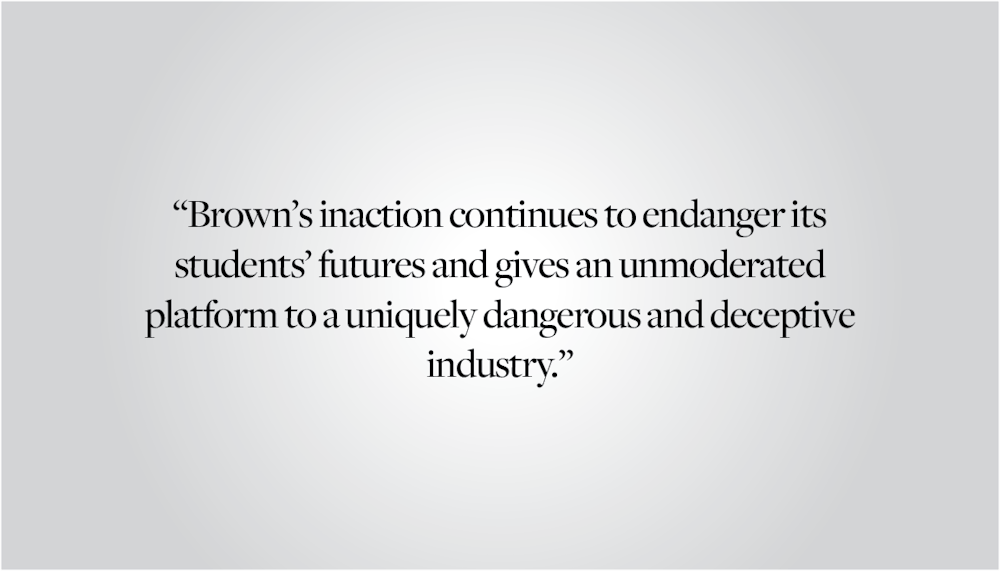In October 2022, nearly 60 student protestors showed up to an ExxonMobil recruiting event hosted on Brown’s campus. Their demand? That ExxonMobil takes its deception and destruction elsewhere.
Despite ending endowment investments in fossil fuel extraction in 2020, the University continues to host fossil fuel industry recruitment events and its researchers continue to accept grants from fossil fuel companies. At these events and through job postings for students, fossil fuel companies advertise themselves as socially responsible while simultaneously advancing science disinformation. Inviting fossil fuel companies to campus is therefore in direct contradiction with the spirit of Brown’s business ethics policy, which states that “the University will not conduct business with individuals and organizations that directly support the creation and dissemination of science disinformation.” To truly live up to its promises of sustainability and academic integrity, Brown must implement a fossil-free careers policy that bans fossil fuel companies from recruiting on campus, posting job openings and otherwise advertising to students through Brown.
When ExxonMobil recruited on Brown’s campus in 2022, the event’s description claimed that the company had “recently reconfigured to focus on diverse energy sources.” This is simply not true: In 2021, only an estimated 0.16% of ExxonMobil’s expenditures went toward low-carbon investments. ExxonMobil’s misleading, climate-friendly rhetoric is part of the industry-wide tactic of “greenwashing,” a practice in which fossil fuel companies overemphasize their minuscule investments in low-carbon projects to distract consumers from their destructive business models. Greenwashing, while not outright lying, is intentionally misleading.
ExxonMobil isn’t the only company that spreads climate disinformation through Brown's channels, and recruiting events aren’t the only medium they use to do it. Right now, BP’s job postings on Handshake — a platform that institutions like Brown can control and customize — claim it is “leading the way in reducing carbon emissions,” even though the company backed off its emissions targets in February amid soaring oil profits. Shell’s Handshake job postings brag about investing in “low-carbon sources such as wind and solar,” when the nongovernmental organization Global Witness could identify only 1.5% of the company’s 2021 expenditures as going toward wind and solar energy development.
Campus recruiting events and misleading job postings are weapons in the fossil fuel industry’s 40-year war on climate science. Harvard professor Naomi Oreskes and post-doctoral research fellow Geoffrey Supran’s peer-reviewed research documented that as early as 1978 Exxon’s own scientists knew that burning fossil fuels causes global warming. But Exxon and its successor ExxonMobil have since aggressively cast doubt on climate science, promoting a narrative that contradicts that of virtually all climate scientists. SLB, an oilfield services company that hosted a recruiting event through CareerLAB last fall, has similarly promoted disinformation as a member of the American Petroleum Institute. API has intentionally misled the public on climate science since 1980 to such an extent that the U.S. House of Representatives singled them out in a climate disinformation investigation.
In recent years, fossil fuel companies have adopted more subtle forms of disinformation. From 2004 to 2006, BP embarked on a $100-million-plus per year marketing campaign introducing consumers to the idea of a “carbon footprint,” deliberately shifting climate responsibility from corporations to individuals. Similarly, a 2020 Shell television ad featured “the CEO of a Shell renewables subsidiary saying she’s ‘made the future far cleaner and better for our children,’” Oreskes and Supran wrote in the Guardian. In the ad, fields of wind and solar farms — again, representing just an alleged 1.5% of Shell’s expenditures — glistened while fossil fuels were glaringly absent.
At first, the fight for fossil-free careers may seem small in scope. After all, only around a dozen interested students came to ExxonMobil's recruiting event last fall. But the consequences extend well beyond disinformation on Brown’s campus. The burning of fossil fuels is responsible for over 75% of general greenhouse gas emissions and nearly 90% of carbon dioxide emissions specifically. And this is not just about green spaces and preserving the environment for its own sake: As a direct consequence of the continued burning of fossil fuels, more than a billion climate refugees could be forced from their homes by 2050.
Respected institutions like Brown help fossil fuel companies maintain their image as part of a socially responsible industry. Brown has great influence, so a vocal fossil-free careers policy would profoundly shift the narrative around fossil fuel companies and their deceitful tactics. Once we as a society deny the fossil fuel industry the legitimacy we grant to other businesses, fossil fuel companies will be forced to change their business models or cease to operate.
Many of my peers have expressed concern that a fossil-free careers policy would infringe upon student autonomy. Though I similarly struggled with this question initially, I now firmly believe that a fossil-free careers policy that upholds Brown’s commitment to sustainability and scientific truth can be achieved without compromising students’ freedom to work in the industry of their choosing. Birkbeck, University of London, one of four U.K. schools to adopt a fossil-free careers policy, has demonstrated the feasibility of striking the balance between student autonomy and sustainability. Birkbeck career services’ Ethical Careers Policy promises that they will not hold relationships of any kind with fossil fuel companies, but that students will continue to receive “impartial one-to-one careers guidance on any industry of their choosing.”
I came to Brown in part because I believed it was committed to a sustainable future and to integrity and truth. I love this University and am proud of our ambitious climate goals, but if Brown wants to be remembered as a climate leader, the time for a fossil-free careers policy is now. Until it implements such a rule, Brown’s inaction continues to endanger its students’ futures and gives an unmoderated platform to a uniquely dangerous and deceptive industry.
Augustus Konigsmark ’26 can be reached at augustus_konigsmark@brown.edu. He is a member of Sunrise Brown. Please send responses to this opinion to letters@browndailyherald.com and other op-eds to opinions@browndailyherald.com.





